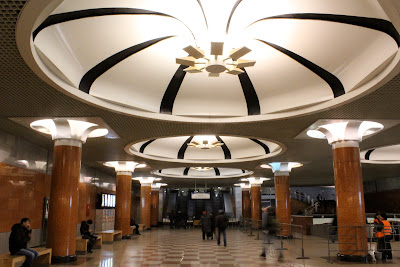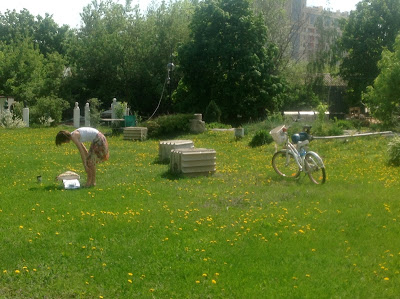Once upon a time, I decided to enter a blogging contest for expats based on the theme "Working Abroad." You see, I think I have a pretty fantastic job and decided it was worth sharing a few of the details. Apparently it didn't make the contest cut, however, so instead you get exclusive reading rights here! Enjoy!!!
...
Putting my experience at the Bolshoi Theatre into words
seems impossible. I could describe the magic of a holiday evening spent mesmerized
by Tchaikovsky’s Nutcracker,
captivated by the exquisite movements of the Russian ballerinas. Or perhaps reminisce
about the first Russian opera I saw in the exquisitely renovated theatre, The Tsar’s Bride. But while those evenings spent at the
Bolshoi will always be vivid in my memory, they are only the beginning of my
story.
You see, unlike most Americans who spend an evening at the
Bolshoi, I work here.
I’m a pianist/vocal coach and while I enjoy every evening
spent in our theatre, the real show (and sometimes the real drama) takes place
behind the scenes. Where exactly? I spent the first month of my employment trying
to figure that out.
What the public sees of the Bolshoi Theatre is only the
beginning. Two stages, an administrative building, 6 stolovayas (cafeterias), an atrium, more confusingly-placed
elevators than I’ve managed to count, and enough rehearsal spaces and offices
to house an insane number of employees, which include a ballet company, opera
ensemble, chorus, orchestras (yes, plural!), security guards, custodial staff
and the ever-powerful babushkas who
fiercely guard the keys to said rooms—ALL of this is connected with an
intricate maze of tunnels that seems nearly as perplexing as the Russian
language itself.
My first week trying to make it to my coachings with singers
involved more than one conversation that went something like this:
- Aleksey,
I’m so sorry that I’m late. I’m in the theater…somewhere. I should be there
soon. (This was the English version in my head. I cringe to think of what
actually came across in Russian at that point.)
-
Where are
you now?
-
Somewhere
near the atrium???
-
Should I
come get you?
-
No, no.
I’m sure I’ll be right there.
Twenty minutes later I’ve finally found my way back to the centrally
located atrium where I bashfully wait to be found and led to work. Even though
I’m already “at work.” I quickly learned this conversation was best modified to
“Come find me please!” Much less
Russian and no venturing unaided into the Russian matrix.
The Bolshoi maze itself may not be enough to compete with
stage antics, put in my opinion there are daily dramas that do. And no, I will
not be talking about acid attacks. Although this is tangentially related….you see, post-acid I was often asked if I
felt afraid as an American working at the Bolshoi. Answer: yes. Was it related
to the acid? No.
I’m terrified of the key guardians.
In Soviet times everyone had to have a job. I’m assuming
this is where some of the Russian systems originate, including that of “the
keys.” (I feel like there should be music accompanying their mention). In the
American opera world where I came from, doors to rehearsal spaces were either
left unlocked, opened by stage management pre-rehearsals, or even by myself.
Occasionally even with my very own
key. But I’m not in Kansas
anymore, as a quick glance at the spidery alphabet on signs everywhere affirms,
and here every room has a key that is carefully guarded in one of three
offices. Often by at least three people. You give them your name, your room
number, your signature, some blood, a pledge of your first-born child (maybe I
mistranslated that one) and try to justify your very existence as they glare
suspiciously at your clearly foreign name. But then they hand over the key and
you can finally give a deep sigh of relief. It seems like the terror is over.
But forget to return it, and it’s really only the beginning.
I don’t know that I can write this in a way that can truly
communicate the seriousness of the key system, but the first time I found
myself at home—about an hour away—with a theatre key in tow, I felt slightly
sick. The second time was even worse. And the third? As I am still living to
tell this story, you can assume it didn’t take place. Chided by colleagues,
seriously cursed by the key guardians (I can only assume all that
unintelligible Russian was foul language) and even slightly shunned by one
singer for my stupidity, I came to understand the importance of a Russian
system that I never mastered. After Round 2, my rehearsal space was shamefully
(but much to my relief) always opened by custodial staff.
I could go on about the culture of the Bolshoi cafeterias,
the tradition of greeting everyone
you pass in the hallway, the ballerinas running around in sweat pants and
slippers…not the ballet kind, but the massive, foot-warming kind…and opera
singers testing out high notes in the elevators, heard from floors below. Horses
waiting backstage for an entrance, neon-colored frog heads bobbing through the
hallway, and the never-ending construction that seems to take place in the
tunnels…it’s all part of the scenery for the stage of daily life at the
Bolshoi. It might not be as glamorous as the first time I set foot in the
theatre, and it definitely doesn’t feel as surreal as my first moment
performing on stage, but it’s this daily life, with its details and dramas that
will truly make this job unforgettable. It’s life backstage. At the Bolshoi.













_%D0%BF%D0%BE%D1%81%D1%82%D0%B5%D1%80.jpg)








































